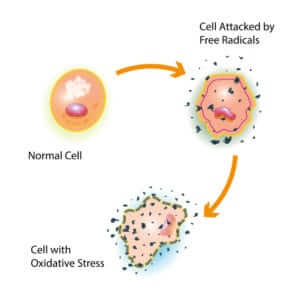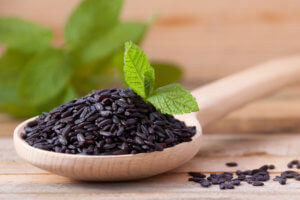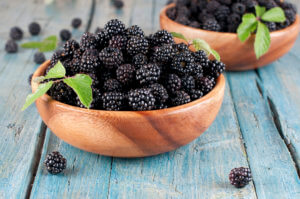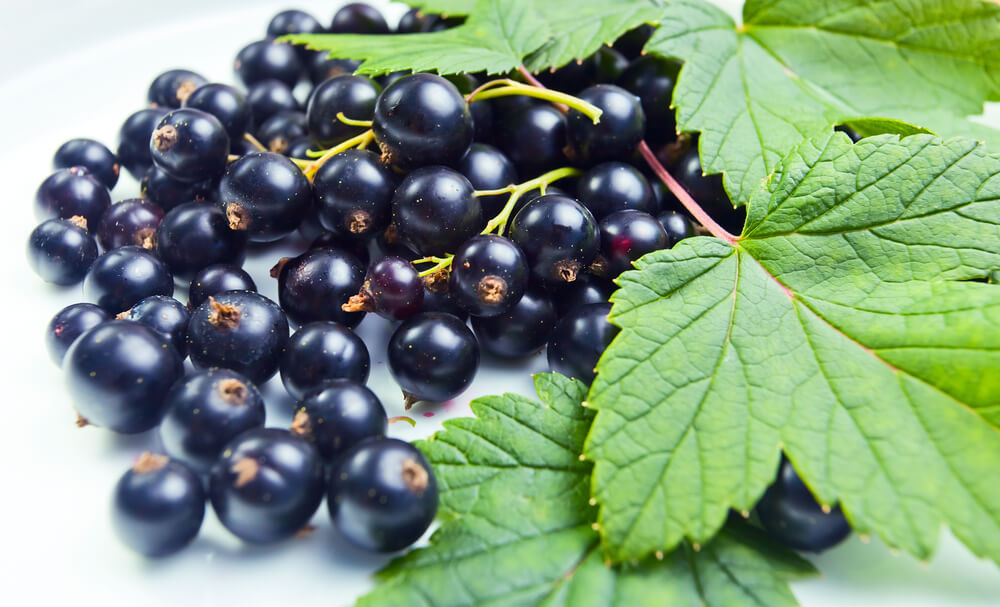There’s no doubt that green, orange, red, and other brightly colored fruits and vegetables are packed full of nutrients. Maybe you’ve even heard the phrase “eat the rainbow” used to describe a nutrient-rich way of eating.
However, there’s a whole group of plant foods not typically thought of that should also be included in your daily diet. They contain numerous health benefits and go by the loose term of “black foods”.
Here’s more about what black foods are, why they are so incredible, and the top 10 to eat.
What Are Black Foods and Why Are They Good for You?
The black foods designation refers to plant foods that are naturally black. Some have a true black color, while others are dark purple, dark blue, and even deep shades of red. All have one characteristic in common: They contain powerful antioxidants known as anthocyanins.
To put it simply, this anthocyanin content is one of the main reasons black foods are so good for you.
Anthocyanins belong to a larger group of antioxidants known as flavonoids. They are responsible for giving fruits and vegetables blue, purple, and sometimes red coloring. This typically means that the deeper the hue of a fruit or vegetable, the more anthocyanins it contains.
Along with acting as plant pigments, anthocyanins also have supportive and protective properties.
Research indicates that these specific antioxidants appear to help attract pollinators, which is extremely important for plants to complete their life cycle. They also help to camouflage plants and repel herbivores and pests.
Isn’t it interesting how these “plant defenders” are similarly protective for the human body?
To show you their full potential, here’s a look at everything they can do.
Top Health Benefits of Anthocyanins (and Black Foods)
Free-Radical Fighting (and Anticancer Potential)

Just like any other antioxidant group, one of the most outstanding benefits of anthocyanins is their free-radical fighting power.
As you may know, free radicals are unstable molecules that can damage cells and tissues. They are now thought to be a major contributor to many chronic diseases and age-related conditions.
One of the best ways to minimize free radicals and prevent their damaging effects is to eat an antioxidant-rich diet. Antioxidants are able to neutralize free radicals by donating an extra electron, which essentially stabilizes them and makes them harmless.
Anthocyanins are an excellent example of an antioxidant group that protects your health as you age. They have shown strong free-radical fighting ability and are able to shield your body from damage at the cellular level.
Because of these powerful protective properties, anthocyanins also have a great deal of anticancer potential. In test tube and animal models, they have specifically shown an ability to inhibit cancer cell proliferation and may slow cancer development.
Combat Chronic Inflammation
Free radical damage and chronic inflammation make up a vicious cycle within your body.
As free radicals cause harm to cells and tissues, they stimulate inflammation in the process. This type of inflammation is not the good kind that helps your body recover from injury (often called acute inflammation). Instead, it builds up and sticks around, causing a lot of stress to your health in the long run.
Unfortunately, prolonged inflammation can cause your body to generate more free radicals. The result is a downward spiral that will likely lead to some type of chronic disease if it doesn’t get addressed.
The good news is that antioxidants have power against both free radicals and inflammation. They get to the root cause (free radical damage) and reduce the inflammatory load within your body.
As a case in point, studies have shown that anthocyanins are able to reduce free radical damage to cells and lower inflammation in the process. This means that consuming anthocyanin-rich foods (aka black foods) is a powerful weapon against disease-causing chronic inflammation.
Heart-Protective

Many types of antioxidants promote heart health, and research is indicating that anthocyanins may be at the top of the list.
To start with, several studies have indicated that drinking anthocyanin-rich juice can help lower blood pressure. In one, both systolic and diastolic blood pressure dropped with systolic being the most significant. Another similar study found that blood pressure dropped and stayed lowered for 6 hours after drinking the juice.
Other research findings also suggest that anthocyanins may help to lower LDL (bad) cholesterol, raise HDL (good) cholesterol, and improve blood flow.
Perhaps even more telling than these relatively small studies are two “mega trials”.
The first followed over 34,000 postmenopausal women. It found that there was a link between a higher consumption of anthocyanin-rich berries and a lower risk of death from cardiovascular disease.
A second research study that followed over 93,000 women had similar results, finding that high anthocyanin intake is associated with a lower risk of heart attack. An excellent reason to regularly eat a range of black foods!
May Protect Against Type 2 Diabetes
Along with safeguarding your heart, consuming anthocyanins may also lower your risk of diabetes.
Like many other chronic diseases, inflammation plays a role in the development of type 2 diabetes. This is something we already know anthocyanins can reduce.
In addition, some research indicates that certain types of anthocyanins may reduce blood sugar levels and improve insulin sensitivity. However, there are limited human trials so far and some conflicting results, so nothing is “conclusive” yet.
That being said, one research review did suggest that an anthocyanin-rich diet could reduce your risk of type 2 diabetes by as much as 15%. Obviously, other healthy lifestyle changes will help as well, but this is a fairly significant risk reduction.
Neuroprotective Effects that May Boost Brain Function

It’s no secret that cognitive decline is often a “side effect” of aging. Diseases like Alzheimer’s and dementia continue to be a significant challenge with limited treatment options.
Perhaps the best way to deal with a loss of brain function is to do everything you can to prevent it. And something that research has made very clear over the last few decades is that what you eat has a big impact on brain health.
To be clear, your brain needs a wide range of nutrients to function at its peak. There’s no single superfood that will prevent or slow cognitive decline. However, foods, nutrients, and plant compounds with neuroprotective properties may be the most essential.
In essence, a neuroprotective agent works by protecting nerve cells from oxidative (aka free radical) damage and toxic substances. This is absolutely key to your brain and entire nervous system staying healthy.
Studies indicate that anthocyanins, particularly one known as cyanidin, possess neuroprotective properties and may help to shield neuronal cells from oxidative stress. In fact, some researchers believe that anthocyanins may be very important for slowing the development and progression of Alzheimer’s disease.
The bottom line is that natural black foods have a key role to play in the health of your brain. Consume them often for optimal results!
Anti-Aging Effects (Including for Your Skin)
If you look at the cumulative effects of anthocyanins, it’s clear that they are major anti-aging compounds. It cannot be overstated how important it is to combat chronic inflammation if you want to age healthfully. A sound heart and mind are critical as well.
Now, again, your body does need a range of nutrients and antioxidants to function optimally. You don’t want to focus only on one group and expect it to be a magic bullet.
Still, it’s important you don’t make the mistake of overlooking dark-colored plant foods just because they aren’t as vibrantly colored as others. As one research review stated, anthocyanins are “good antioxidants for preventing or reducing the risk of disease.”
That’s quite an impressive statement and gives you an idea of how eating black foods can boost longevity!
However, the anti-aging effects of anthocyanins don’t stop there. Recent research suggests that anthocyanins may also help protect your skin from UVB rays.
This is exciting news because UV damage is one of the biggest age-accelerators for your skin, causing it to look prematurely old. Anything you can do to protect your skin will keep your complexion looking younger for longer.
Other Potential Benefits of Anthocyanins

To put it simply, there are almost too many benefits of anthocyanins to list. The most impactful and well-researched ones have already been explored in detail, but a few more are worth mentioning.
Vision Health— Studies show that anthocyanins, particularly those from dark-colored berries, are very supportive of healthy vision. They have a protective effect on your eyes and may improve visual function. Anthocyanin extracts (from berries) have also shown potential for preventing retinal degeneration. More human studies are still needed to confirm these effects.
Antimicrobial Properties— Interestingly, anthocyanins have shown a range of antimicrobial activity. They appear to especially inhibit the growth of certain food-borne pathogens, including Listeria and E. Coli. One extract also showed activity against Staphylococcus aureus, the bacteria that can cause staph infections.
May Support Immune Function— According to one research review, anthocyanins may reduce the incidence of immune system diseases. This conclusion comes from studies showing the potential of anthocyanins to calm allergic inflammation, which involves immune system hypersensitivity, and aid certain autoimmune diseases like rheumatoid arthritis. However, most of these studies have been lab or animal models, so results are not conclusive.
May Have an Anti-Obesity Effect— Animal studies indicate that anthocyanins have anti-obesity properties. One large human trial also discovered a correlation between a higher intake of flavonoids, particularly anthocyanins, and lower fat mass. The study used sets of identical twins to rule out genetic factors, which gives added weight to the findings.
May Support Lung Function— A surprising study from 2016 indicated that consuming more anthocyanins may help prevent age-related decline in lung function. This analysis was drawn from a limited sample group, but it does give you food for thought (or perhaps food for your lungs).
Top 10 Black Foods List

Now that you know more about how incredible anthocyanins are, how do you get more of them?
It’s hard to go wrong with eating a range of dark-colored fruits and vegetables, but there are a few that stand out from the rest. You may have already noticed a theme of anthocyanin-rich berries containing some of the best health benefits, and you’ll find several of them on the list.
Without further ado, here are the best black(ish) foods for your daily diet:
- Black Elderberries— Elderberries have well-known immune-boosting properties and are high up on the list for anthocyanin content. They also have an excellent vitamin C and fiber content.
- Black Currants— Currants are popular in Europe but less so in the U.S. However, you may want to consider finding or growing these berries, since they are one of the richest fruits in anthocyanins.
- Blackberries and Black Raspberries— With their deep purple-black color, it’s no surprise that these berries contain good amounts of anthocyanins. They specifically contain cyanidin, the anthocyanin with neuroprotective properties.
- Black Rice— Anthocyanins are the pigments that give black rice its color, potentially making it better for you than brown or white rice. Black rice bran even rivals blueberries for antioxidant content and is less expensive.
- Blueberries— Blueberries, the original superfood, are “abundant” in anthocyanin pigments despite the fact that they are more blue than black. Do note that wild-grown blueberries tend to be higher in antioxidants than store-bought ones.
- Black Beans— The seed coat of black beans is very rich in health-boosting anthocyanins. To make this legume more digestible, soak your beans overnight before cooking them.
- Plums— Most plums contain anthocyanins, but opt for the dark purple varieties to get the greatest amount. Also, anthocyanins are mostly concentrated in the skin of plums, so be sure to leave it on when you eat them.
- Bilberries— Bilberries are one of the richest natural sources of anthocyanins, but they are down on the list because you won’t typically find them in a grocery store. However, these blue-black berries can be grown and also taken as an extract/supplement.
- Eggplant— The deep purple-black color of eggplant tells you of its anthocyanin content. Again, most of these antioxidants are concentrated in the skin, so be sure to leave it on.
- Red Cabbage— It might be a stretch to include red cabbage on a black foods list, but it has a truly impressive amount of anthocyanins. Studies show that this brassica has over 20 different anthocyanins, not to mention cancer-fighting properties.
Get the Most Out of Black Foods
Clearly, there are numerous reasons to include more black foods in your diet. And many, particularly dark-colored berries, have the added bonus of being delicious.
The best way to approach black foods and anthocyanins is to simply eat a variety of them. This ensures that you are getting different individual antioxidants and plant compounds that all have their own unique benefits.
Of course, it’s also very important to buy organic produce whenever possible. You don’t want the harmful effects of pesticides to negate the beneficial properties of anthocyanins. Better yet, try growing some black berries, beans, or eggplant to get anthocyanin-rich food straight from your garden!
NEXT UP: Get Your Permanent Recordings & Transcripts of the Food Revolution Summit Docuseries FREE Today
If you appreciate these helpful insights about black foods, you are going to LOVE the latest & greatest Food Revolution Summit Docuseries!
In it, world-renowned health leaders John and Ocean Robbins interview 45 of the planet’s top food experts, revealing the latest breakthroughs to best heal your body — with food!
And right now, you are getting immediate and permanent access to the complete recordings and written transcripts of the entire 2024 Food Revolution Summit Docuseries FREE when you order the recordings and written transcripts of the new LET’S GET PERSONAL: The Ultimate Healthy Aging & Longevity Summit (which is available today with a special Early Bird savings of 66% OFF before the price soon goes up!)
Head here now to see this & all 16 of the amazing gifts you are getting today (worth over $2400!)
The experts featured in the 2024 Food Revolution Summit Docuseries include Dean Ornish, MD… David Katz, MD… Columbus Batiste, MD… Dean & Ayesha Sherzai, MD… William Li, MD… Michael Greger, MD… Robynne Chutkan, MD… and more!
And, YES, you really will own the entire 2024 Food Revolution Summit Docuseries — all the recording and written transcripts, plus over $1000 of their additional gifts for you — as a free and immediate gift for you today….
When you order the new LET’S GET PERSONAL: The Ultimate Healthy Aging & Longevity Summit recordings & written transcripts (which is 66% OFF today… you will pay just $67 TOTAL in today’s Early Bird special before the price goes up!)
PLUS, you are getting 15 more outstanding gifts in addition to the entire Food Revolution Summit Docuseries, so…
>>> Click here right now to find out more & order the LET’S GET PERSONAL recordings & transcripts at 66% off today — do check out all 16 bonus gifts you get right away when you order today, including the entire 2024 Food Revolution Summit Docuseries!



amazing site with amazing info! – and you do not torture the reader with agonizing dramatic stories that never seem to end and cause many to leave the site
thank you!!
agree‼️‼️those tedious long emails with long dramatic tragedies are useless‼️‼️
Amen to that!
I was not aware of black rice so thank you we learn something every day.
Only black rice I ever knew of was wild rice, so same here
I love the “black” foods and am lucky to live where blackberries are prevalent and I freeze them to enjoy all year long. One berry you left out was aronia or chokecherry. When dehydrated they are sweeter and less astringent to eat. I make a jam with them that is out of this world. I believe I read they have 9 times the antioxidants of blueberries. They are easy to grow and pest free.
Thanks for a great share.
Never heard of Aronia, is that not found in the UK? I have blackberries and blueberries in the garden, and someting that could be elderberry, but afraid to eat in case it`s not.
Having elderberry in your garden would be a bonus. You may want to get a plant identification app and check it out.
One type of Aronia is native to the US, but it’s also apparently grown in Europe. Wikipedia says it’s mainly in areas of Eastern Europe, specifically Russia and Lithuania. The growth requirements suggest that it can easily be grown in the UK, so perhaps it exists under another name? I would check with a local plant nursery to see.
Thank you for sharing that info!!
Hello, I would like to get your jam recipe. And by the way where do you live that you can easily grow those berries?
Well said, I agree. Thanks for the information on black foods, I was unaware of most of it.
agree
i so agree🤨‼️‼️‼️👍
I agree!!!
agree!!!
Totally agree. Thank you Brian
Thanks for this information on black foods. I make a fire cider with elderberries and we eat purple cabbage, blueberries, and black beans regularly. I will try the black rice. Thank you for this information.
I love your fire cider recipe! Can you please share? I never heard of berries in fire cider.
I would love your elderberry fire cider recipe!
I love your articles. I always feel smarter and more confident to make positive changes in my life. Also, I share my new found knowledge with all of my family members. At least the one that will listen (LOL) I appreciate your research and hard work. Thank you so much for the enlightenment and wealth of knowledge that can be easily applied to daily life. You Rock
Thanks for the awesome information about the elderberries. We do eat black rice but not always .appreciate all your research and share to everyone of us.. thank you and GOD Bless you and your Family..🙏
Thank you. I eat blueberries and black grapes every day and occasionally have wild rice (never white rice) and have blackberries in season and some red cabbage. I do try v hard to do the right things.
Love the information you provide. Nutrition is key to preserving health and combating disease. Thank you for being a guiding light.
Thanks so much for this very informative article! Great info!
Very insightful article and useful information. We don’t hear about these foods often so it is great to get this information. Will have to look into growing these fruits and vegetables now I know the importance of them. Thank you.
Very greatefull for the information you provide about the health benefits of black foods.
To know what to eat is very important for our health and to prevent illness,
Trying to get my wife to eat some of those on your list, she is dealing with dementia. And I do agree with J. C. Matthews.
Carlos S.
I didn’t see some of the most wonderful black tropical fruits that grow in Florida on your list: jaboticaba, grumichama, and mulberry (which grows almost anywhere). These are all fruiting or setting fruit in our yard right now. Mmmm!
Yay for mulberries! I have a tree growing in my yard in PA, that is very abundant. It just planted itself and grew and grew.
good going!
I love those mulberries. Especially the darkest,
sweetest ones.
Definitely mulberry. We pick and freeze them to put in smoothies every day. Black muscadine grapes would also be good in the southeastern US.
With all the recommended things to eat, I find it difficult to fit them all in. I do, however, always appreciate the information.
Ive never grown blackberries blackbeans nor eggplant although I remember when my cousin grew eggplant years ago. I have space to grow but lack experience. I guess I’ll use youtube.
We grow chokecherries and make pancake syrup from them. Does the cooking process (heat) affect the nutrient value? If so, to what extent? I’m sure the vitamins would be lost but what about the phyto chemicals?
Love this article! I’m big on berries and plums, but I didn’t know about the black rice. I’ll have to try that.
Thank you Brian for info. You are a treasure of good news. I eat blueberries every morning that come frozen so very handy. Will expand my black food intake. Kathleen 😋
Thank you for this interesting article!
I thank you for your researched information detailing the benefits of “black foods”.
I get wary when I read, “may” in an article promoting the benefits of a certain food.
I would appreciate you sharing the research sources too.
Your articles are beautifully written and inspire trust. We, the People are inundated with TV advertisements,, online miracle supplement articles that are often false and misleading.
Thank you again for your honesty. Marion C
You are so right to ask for citations. Far too often the ‘studies’ are animal based or have very few subjects in the research. This makes it impossible to extrapolate any outcomes to the wider population. That’s why the use of words such as ‘ may’ are used. Basically a*** covering but not real scientific basis for the claims being made.
Hi there, all articles are extensively researched. Scroll up and see article. All the links are to the research sources.
Love your work, and you 🙂 so grateful
for all information put forward,,, for our well-being & knowledge 🙏
Brian , Love your work, and you 🙂 so grateful for all your information & knowledge,, put forward for all our well-being 🙏
Your articles are interesting and to me fool proof. I eat most of the black foods regularly and start my mornings with a black food smoothie. I shall look for black rice, and prepare it with my dry fry eggplant and fried red cabbage. ALL HAIL BLACK BERRIES AND BLACK FOODS. Many thanks and keep up the good work.
I’m in the UK and love to receive your informative articles. They are all archived for the future as I cant remember everything and need referencing from time to time. Thanks again.
Always feel nurtured and cared for after reading your thoughtful shares. I am actually starting a small elderberry tree from a cutting. I usually do purple grapes but after reading your article I am going to add more black variety. Thank you for your loving kind service.
Never thought to categorize Black Berries and foods and how nutritionally important they are; definitely plan to expand my horizons ( add more Black Rice and Eggplant and Red or Purple Cabbages.
Thanks for sharing this Brian; was very informative!😊
Great News, Thanks for the info, I have a lot of Inflammation , every bit of info helps. Thanks keep up the Good work! I am in Canada
Great right to the point no blablabla thank you for the information Diana
Good information to encourage me to eat more black fruit and berries. Thank you!
I agree with the appreciation expressed above. Useable information, simply presented–can’t beat that!
will eat more black foods than we do now. many thanks for excellent information.carol and Tom South Shields.
Thankyou for all your wise teaching ..will have to look for elderberries I drink the tea….I get black rice at a Chinese shop …I live in South Africa…but will definitely look for more of the black fruit..love blueberries…thankyou for all the work you put into your teachings ..blessings
I am grateful for all the healthy black food, fruits and veggies info you sharing.I want to grow some.Where do I start…..nursery ?I really lack insight on this amazing food and I don’t know most of them.
I have a bad memory can you make this into juice? I hope it can make things easy for me. my husband has cognition problems I buy him vitamins etc to help him heal the pressure wounds on his feet. and I really can use help for myself we are seniors in our 60;s Thank you
god bless you
i have never hear about this before i realy appriciate this important information.I will share this.
Another black berry, which most people don’t know they can eat, is ripe black nightshade berries. They are small, nutritious, and very tasty.
Don’t be put off by the “nightshade” word. BLACK nightshade is not the same as DEADLY nightshade. The former is safe and nutritious (the leaves and the black berries the plant produces), but avoid eating the unripe green ones. Also, don’t binge on them. A small handful is quite enough. The leaves are great added to green smoothies.
I have been using only black rice for several year. I love the forbidden rice noodles. So happy they are good for me. Nettie
Very helpfu! Learned what foods and how these help in protecting or reducing to fight agomg amd/or illness factors. AND not medicine but foods!
very good and useful information.
Thank you Sir, for such important and healthy information. I do own a black berry tree, but I did not know the berries were such healthy black foods. Well, the old order has change now. I am going to make good use of the.
Thank you for such important information. I was not aware that black berries were such heathy fruits. Very interesting learning for me. Never heard of black rice before though.
Great information, but aronia berries were not on the list. One of the highest fruits in antioxidants. Some farmers markets have them, as fresh berries, frozen and/or juiced. Some people may like a little sweetener with these mouth-puckering tart fruits, but they mix well straight with oatmeal or muesli and can go into smoothies. And straight aronia juice can be an acquired taste.
Great information. I am familiar with some but need to add more to my list.
Black rice?? will try to find soon.
Great inspiration!!! Thanks
There is a tree, we have one, that produces black fruit, Blacksapote (chocolate pudding fruit) Has this the same nutrients? It is very very delicious.
Very helpful health information. So Thankful .
Where to buy black rice plus how to make fire cider
Thank you
Hi!
I’ve recently started putting one large or two small red cabbage leaves (along with black currants and blueberries) into my late morning breakfast smoothie, along with kale and many other nutritional goodies!
It’s immensely energising!
Will have a go at the black rice, that’s so cool to know how good it is! Thank you!
What about mulberries? Do they also offer these benefits?
Great research, really wonderful foods!
Do you include Black sesame in this list?
Thank you for another great article.
Thank you for this notation on the black forms of nourishment.
And black rice too. Ivery much enjoy this prompt
Appreciate All the Wonderful Helpful Info! I’m a Fruit Junkie and will be adding some of the Sweet new items U shared, Thx!
Every thing you mention is great I hope to try other things like black rice never seen it here please send us more things on thos ok
Thanks a lot.Great article.
And Acai berry from the amazon forest (not fresh though).
Thanks. Will put them on my list for next grocery shopping.
Some new and interesting info.
Always learning. Thank you.
Very thorough article — enjoyed it. Thank you.
I do wish currants were more popular in USA because that would probably bring the price down.
Very helpful information about nutrition. Thank you for sharing.
And for the funny jokes too
What about cherries, especially the darker ones?
thank you Brian for this wonderful information’
wondering if black rice has arsenic like others
Dr Fuhrman does not suggest eating more than twice per week but I am concerned that tempeh which is so good for vegans ALSO has rice, so I am limiting it to 3x/week
I do not know which way to go sometimes! so confusing!
rivka
This is really helpful. And my many of favorites are in the list. Thanks so much Brian for constantly sharing such valuable information.
Thank you for the very informative article. I do incorporate many of the black foods into my diet.
black beans are easily available in Kenya, cucumber, and few berries. there is a unique black fruit from the hard wood tree Meru Oak, it’s seasonal, sweet, I hope it makes it to this list
Really enjoy reading your articles – as said above – Short Concise and to the Point without the waffle – easy to read and learn from. I often quit before I’ve started when I open an article that requires reading a dramatic Novel prior to getting to the point.
Even enjoy the Dad jokes – which our house is full of as well xx
Thank you, Brian Vaszily, for another clear and concise and informative article!
thanks for sharing and the info is much n always appreciloved.your readings always bring insight n a sense of motivation to keep pushing for the long,healthy n happy life.may you n your family be blessed.